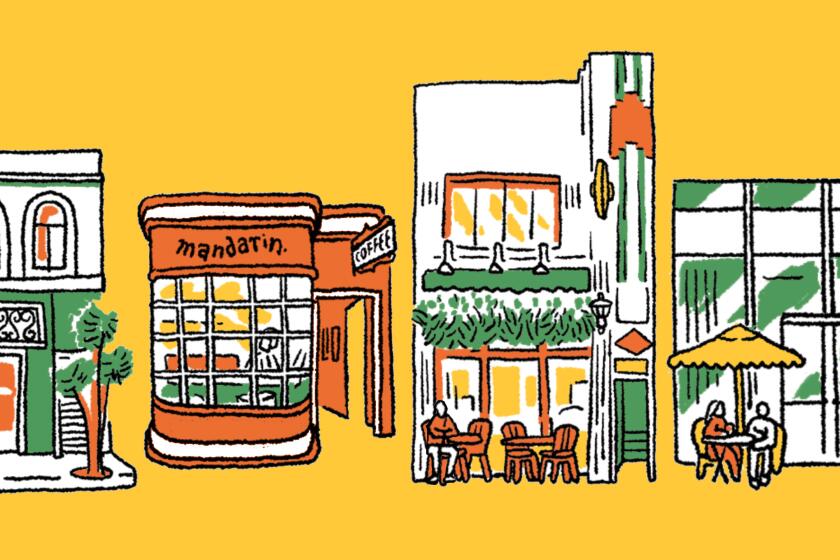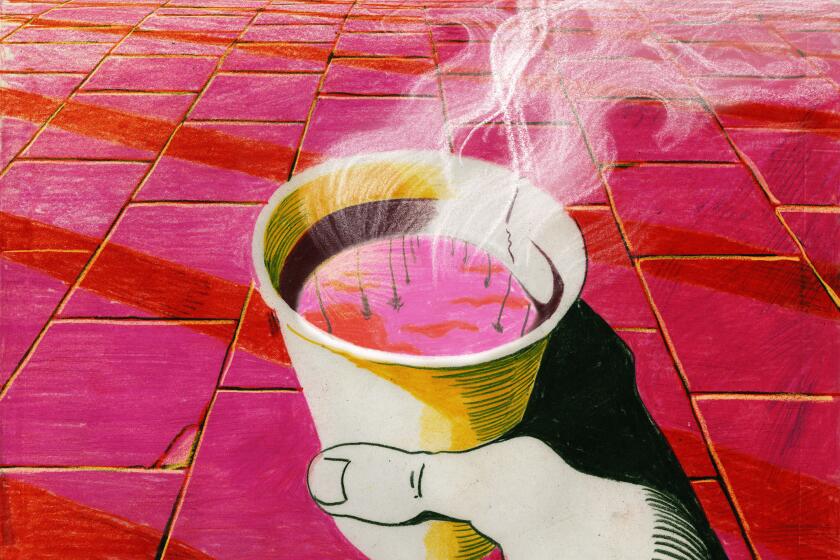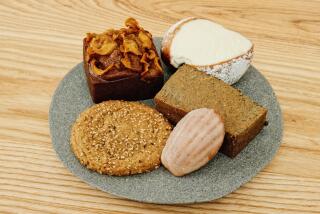You should be drinking more coffee from China, according to this new Pasadena cafe
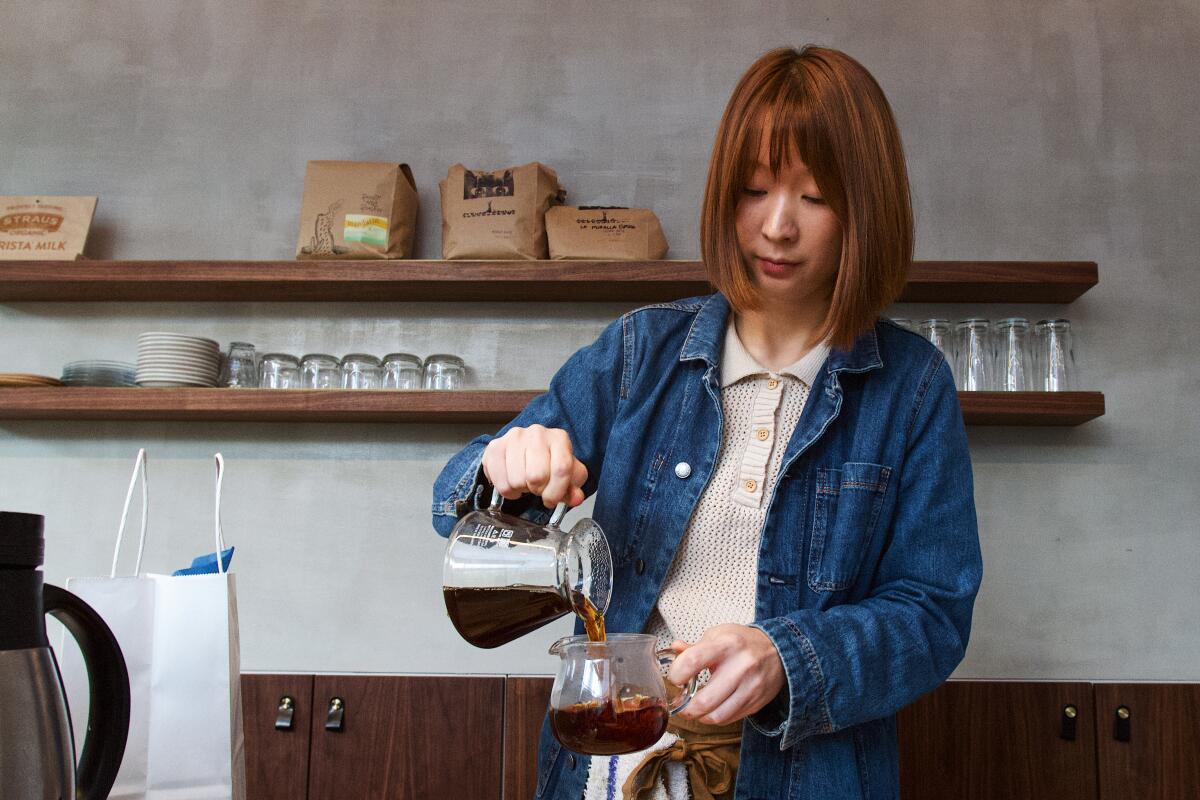
Beyond a curved bay window painted with flowers, Sherry Gao is pouring coffee made from single-origin beans, infusing honey with tea leaves and hoping that her Mandarin Coffee Stand — all but hidden in a charming Pasadena arcade — will introduce you to your new favorite coffee and turn your preconceptions about Chinese beans upside down.
Much of the Western world imports its specialty coffee from Africa and South America. Gao’s new shop also pulls shots and sells beans from Guatemala and Ethiopia, but the owner and former Intelligentsia barista hopes that shedding a light on Asian flavor in lattes and Yunnan-sourced coffee could expose customers to the coffee-producing region — and help to dispel bias against the beans, which for decades, until only a few years ago, were primarily used not for specialty drinks but commodity coffee such as instant products.
“We wanted to highlight Chinese coffee because a lot of people never had Chinese coffee before, or even if they have, they had a really bad experience with it,” Gao said. “[Some] have the mindset that it’s bad or it’s cheap, but that’s not the case anymore. It’s been changing so much over the last decade. They keep getting better and better, so I’m hoping to change people’s minds in terms of the stereotype.”
Find the best cafes, freshest brews and your favorite beans in the coffee-shop capital of the world.
Gao’s own first impression of Yunnan coffee wasn’t the strongest, but that’s changed. She first tasted it roughly six years ago not as a professional but as a curious consumer while visiting China; standing at a small kiosk at a coffee expo were farmers offering samples of their own brew. She doesn’t want to speak ill of it but says that it wasn’t much to her liking — which she credits largely to the processing: Honey and natural processing are ubiquitous practices in China, though much of the coffee that ends up in the U.S. has undergone a washed, or wet, process, that requires fermentation and water usage before the beans dry.
Recent experimentation with processing — such as the addition of fruit or sugarcane molasses during the fermentation process; anaerobic tanks; or using multiple methods — is leading Yunnan’s coffee farmers to more nuanced and flavorful results.
“Every time a new product comes in, it tastes better than the last one,” Gao said. “You can see that it’s getting better and better. We were like, ‘We want to be part of it.’”
Farmers in China have grown tea for more than 3,000 years, but coffee has been cultivated there for only about a century, with an uptick in the 1980s: first with government incentivizing, then around the turn of the century and the 2010s with international corporations investing in the region’s crops, primarily initially for use in commodity coffee. A number of Western companies have planted flags in Yunnan, China’s premier coffee growing region, in a bid to get in on the growing market. Starbucks, one of the first to enter the space, has promised to train 50,000 coffee farmers by the end of this year.
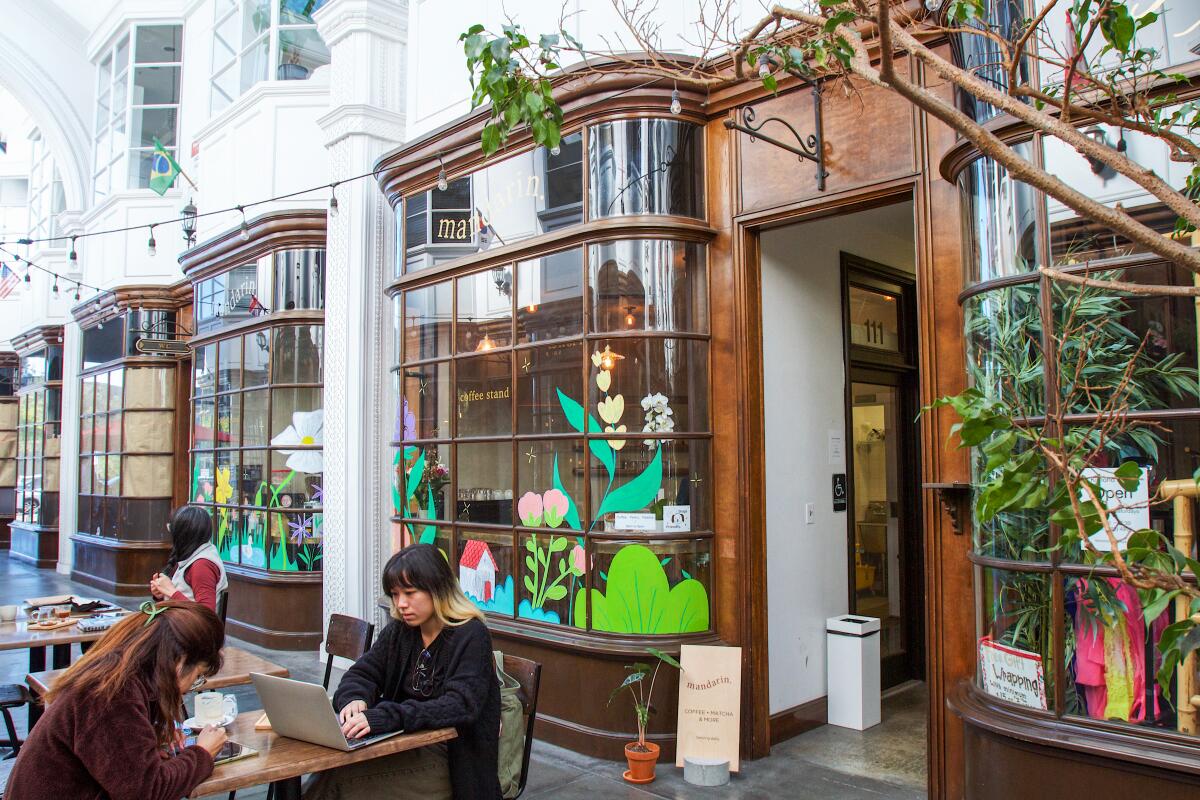
But in the last 10 to 15 years, tastes and demand for specialty, high-grade and third-wave coffees emerged, especially from local growers and shops. According to Chinese news outlet the Paper, more than 6,900 coffee shops exist in Shanghai alone, with more than 4,200 of them independently owned.
According to Tohm Ifergan, China’s retail coffee market “is exploding.”
Ifergan’s Dayglow Coffee operates in Silver Lake and West Hollywood and by mail through a popular coffee subscription service. The owner says he sampled 20 to 30 Chinese coffees annually for roughly five years but only more recently — given improvements from processing experimentation and investment in the specialty retail realm — has it piqued his interest. He’s also noticed the proliferation of specialty Yunnan coffee over the last two years and has begun offering it occasionally in-store and through his subscription service, hoping to introduce his customers to the locally lesser-known coffee region. It’s heartening, he says, to see Mandarin stock the beans, just as it is to see more of the global industry taking note and reaching out to China’s farmers to collaborate and educate. The product, he says, has a lot of promise.
“What makes Chinese coffee interesting to me is it’s got a unique terroir,” Ifergan said. “When you taste that, you immediately can see that it’s a Chinese coffee. There’s a common perception of what these coffees are and how they are, that they’re low quality. And I think that’s untrue.”
Light, medium or dark roast? Notes of apricot, chocolate, pecan? Arabica or robusta? What’s the ‘L.A.’ style? All your coffee bean questions answered.
Much of the region’s coffee output is exported for and through major corporations, while domestic demand for China-grown coffee has risen so dramatically that Gao says it’s now hard to outbid the market of China-based coffee shops, which are willing to pay a premium. “You just simply can’t compete with internal buyers,” she said. “They will pay any price for that coffee because it’s very trendy right now in China.”
Ben Wilde began contacting farmers and exporters through WeChat forums and works directly with the farms to bring unroasted Yunnan coffee to the U.S. His wife, Kina, operates Chinatown Coffee Roastery, a micro operation that currently offers three varieties of the single-origin Chinese coffee, among others, plus one blend. The white-and-black bags sit in a back corner of Alex Cheung’s Antique Shop in Chinatown’s Chung King Court, where Kina Wilde roasts the washed Menglian, honey-processed Yunnan and naturally processed Xishuangbanna beans.
“It’s a little bit more expensive because it’s really hard, logistically, and the customs progress is more arduous,” said Ben Wilde, who founded his green-coffee company, Pacifica Renew, in 2020 and imports Chinese coffee regularly. “This is a hard country to get coffee from.”
The Wildes didn’t begin roasting China-grown coffee. Ben Wilde had also heard that the country’s beans were subpar for anything beyond commodity use, but they began to investigate and sample, delighting in what they found. “You get a lot of these kinds of fruity acidities, and in a good way,” he said, “kind of the citrus, but you also get some of the subtle earthy flavors of black tea.”
Micro and midsize roasters are already sourcing from Wilde, and he says that recently, larger coffee companies have begun contacting him about the possibility of purchasing by the container load.
“Obviously, when those guys get it, it blows the roof off this thing,” he said. “Right now it’s in the whisperings between roasters and cafes, but to me, wherever it’s at, it’s positive every step of the way. You get to be part of this growing thing that spotlights a new origin that’s really underrated — in many ways, not even rated because people just don’t even think about it.”
Both Ifergan and Gao hope to see Chinese coffee gain awareness and popularity beyond Asia and Europe, where many of its specialty importers are located. Gao sources hers solely through Montreal-based roaster Rabbit Hole, which has been importing Yunnan-grown beans for years.
What should we expect from a cup of coffee in Los Angeles? Almost anything, our critic learns.
These beans, which yield a light, almost almond-like flavor, first ship to the United Kingdom via the London-based Asian-coffee importer Indochina Coffee, then fly to Canada, where they’re roasted by Rabbit Hole’s team. From there they make their way each week to Pasadena, where they were first included in Mandarin Coffee’s house blend of espresso but now run as a single-origin espresso so that guests can better taste and appreciate the flavors independently. Gao also sells 250-gram bags of the whole beans at $2 to $3 more than the bags of her shop’s varieties from Ethiopia, Guatemala and Mexico. Currently it’s the only Chinese coffee that Rabbit Hole offers, but the roaster is working to expand its offerings from a range of Asian countries, which Gao is looking forward to showcasing.
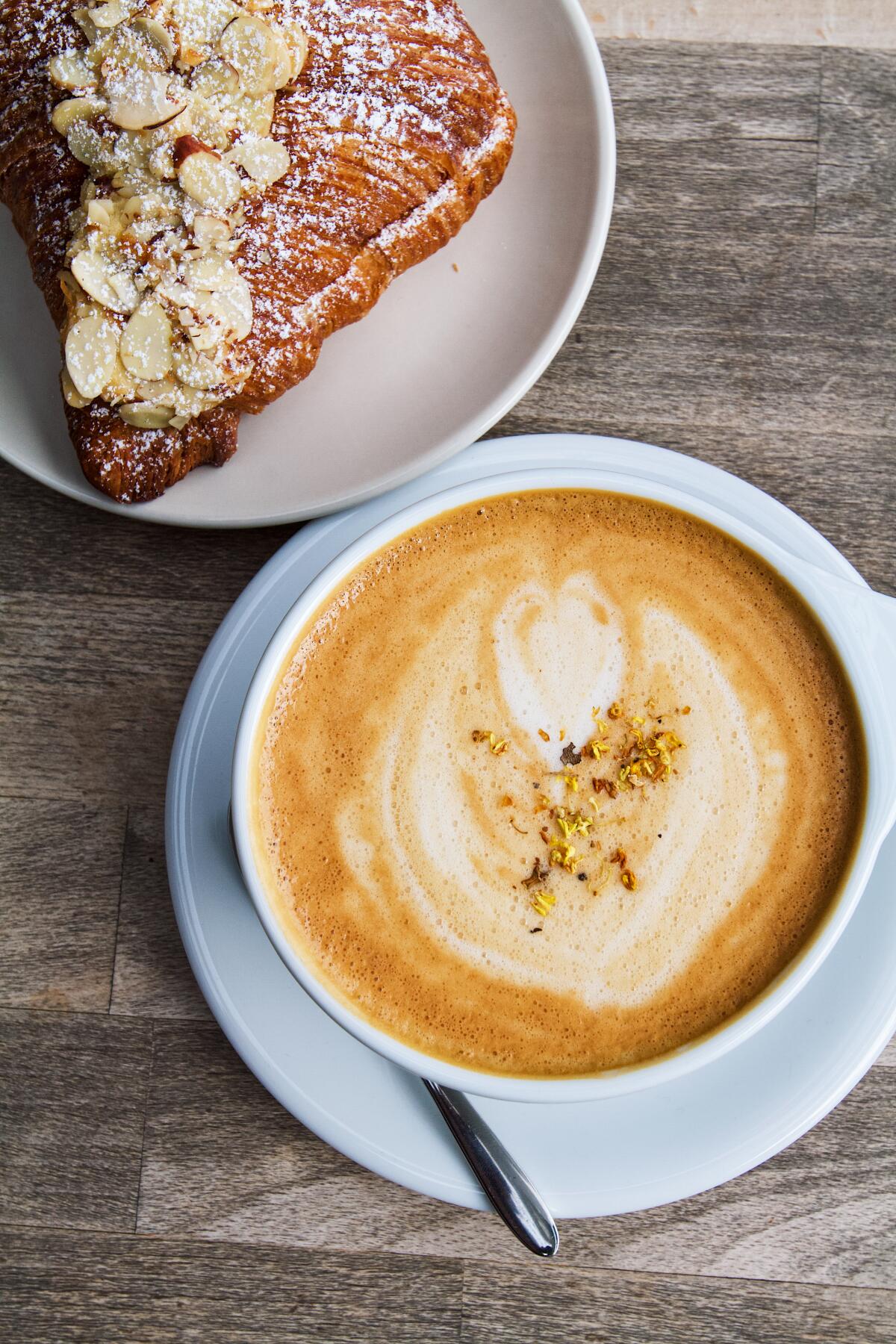
Gao isn’t only hoping to spotlight Chinese coffee culture through single-origin espresso pulls. Her signature lattes at Mandarin Coffee Stand evoke classic Chinese and Taiwanese dishes, drinks and flavor profiles spun in new and creative fashions. For the Gui Hua espresso latte, the team makes osmanthus syrup daily to avoid the tea’s notes growing bitter, infusing honey with osmanthus for at least 18 hours. The Toasty’s flavor profile is inspired by Hong Kong milk tea, but it’s made with espresso, rooibos tea and Taiwanese brown sugar. A pineapple take on an espresso tonic was inspired by Wong Kar-wai’s classic film “Chungking Express” and uses house-made pineapple jam and Chinese rock sugar.
To further connect with the community, Gao hopes to one day host classes for home brewing and offer other interactive how-to events. After all, she says, the Yunnan coffee tastes excellent made in one’s own kitchen with a pour-over system — she hopes it’s only a matter of time before home specialty-coffee enthusiasts catch on too.
Mandarin Coffee Stand is at 380 S. Lake Ave., Suite 111, in Pasadena and is open daily 8 a.m. to 4:30 p.m.
More to Read
Eat your way across L.A.
Get our weekly Tasting Notes newsletter for reviews, news and more.
You may occasionally receive promotional content from the Los Angeles Times.
